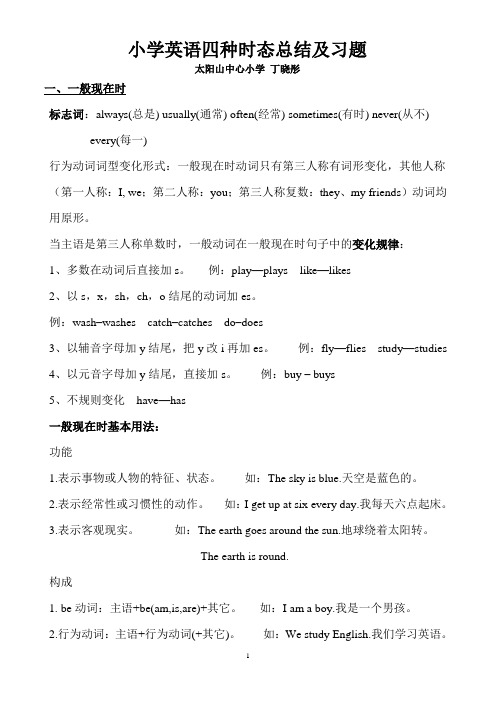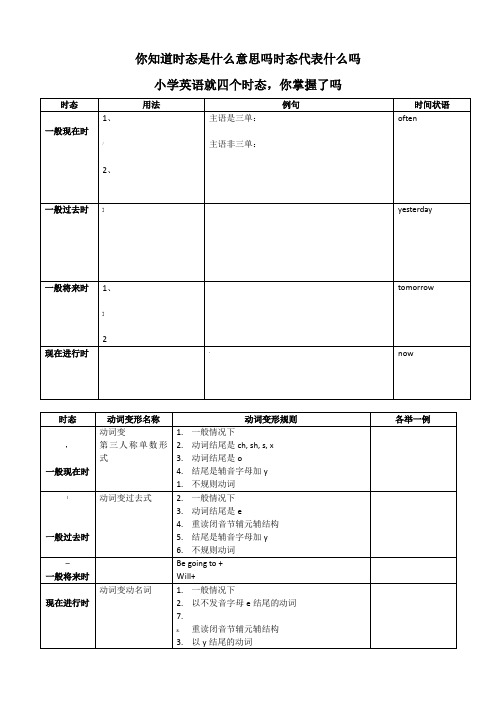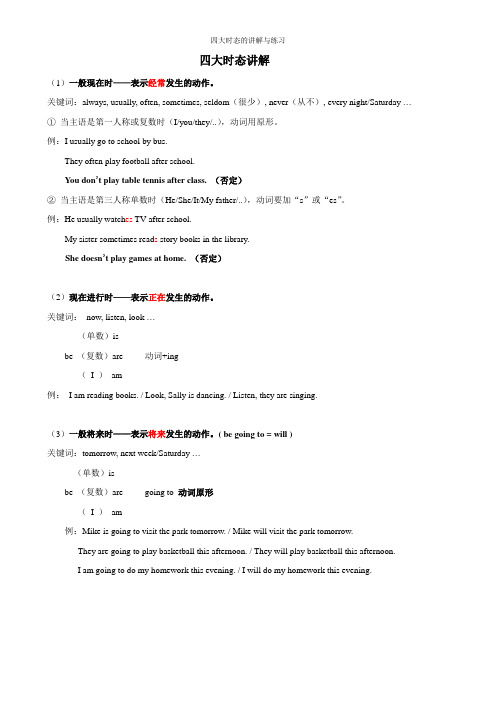整理小学四种时态讲解及专项练习
- 格式:docx
- 大小:14.37 KB
- 文档页数:5

小升初英语四大时态复习讲解及真题专项练习含答案一、重点讲解考点一:动词的基本形式1.动词原形(分实义动词、助动词、系动词、情态动词4类)(1)助动词(do/does/did)紧随其后的动词用原形;(2)情态动词(can/could/should/must/would/will/shall/maybe)紧随其后的动词用原形;(3)祈使句(表示命令式的语句)用原形;Eg: Open the door, please.(4)固定搭配。
let sb do sth/help sb do sth/make sb do sth/why not do sth.2.第三人称单数(用于一般现在时)变形规则:(1)一般在动词词尾加s。
如: work→works、read→reads、look →looks、live→lives。
(2)以ch、sh、s、x结尾的,在词尾加es。
如: catch→catches、finish→finishes、guess→guesses、。
(3)以o结尾的动词,分2种情况:有生命的加es,如:hero,tomato,potato;没有生命的加s,如:radio,photo。
(4)以辅音字母加y结尾的动词,变y为ies。
如: fly→flies、study →studies、carry→carries.(5) 不规则变化。
如: have→has ,are→is,were→was3.现在分词(用于现在进行时)变形规则:(1)一般在动词后加ing。
如: work→working、read→reading、look →looking、wait→waiting。
(2)以不发音的e结尾的动词,去掉e,再加ing。
如: smile→smiling、move→moving、take→taking、write→writing。
(3)以重读闭音节结尾的且词尾只有一个辅音字母的,双写这个辅音字母加ing。
如: sit→sitting、stop→stopping、cut→cutting、run →running、swim→swimming.(4)少数几个以ie结尾的动词,将ie改为y加ing。

小学英语四种时态总结及习题太阳山中心小学丁晓彤一、一般现在时标志词:always(总是) usually(通常) often(经常) sometimes(有时) never(从不) every(每一)行为动词词型变化形式:一般现在时动词只有第三人称有词形变化,其他人称(第一人称:I, we;第二人称:you;第三人称复数:they、my friends)动词均用原形。
当主语是第三人称单数时,一般动词在一般现在时句子中的变化规律:1、多数在动词后直接加s。
例:play—plays like—likes2、以s,x,sh,ch,o结尾的动词加es。
例:wash–washes catch–catches do–does3、以辅音字母加y结尾,把y改i再加es。
例:fly—flies study—studies4、以元音字母加y结尾,直接加s。
例:buy – buys5、不规则变化have—has一般现在时基本用法:功能1.表示事物或人物的特征、状态。
如:The sky is blue.天空是蓝色的。
2.表示经常性或习惯性的动作。
如:I get up at six every day.我每天六点起床。
3.表示客观现实。
如:The earth goes around the sun.地球绕着太阳转。
The earth is round.构成1. be动词:主语+be(am,is,are)+其它。
如:I am a boy.我是一个男孩。
2.行为动词:主语+行为动词(+其它)。
如:We study English.我们学习英语。
句型肯定句:A. be动词:主语+ be + 其它成分如:He is a worker.B.行为动词:主语+动词(注意人称变化) +其它成分如:We like the little cat.否定句:A. be动词:主语+ be + not +其它成分如:They are not students.B.行为动词:主语+助动词(do/does) + not +动词原形+其它成分如:We don’t like the little cat.一般疑问句:A. be动词:Am / Is /Are +主语+ 其它成分如:Are you a teacher? Yes, I am. / No, I am not.Are they students of your school?Yes they are / No they aren’t.B.行为动词:助动词(Do/Does)+主语+动词原形+ 其它成分如:Do you like it? Yes, I do. / No. I don’t .Does he(she) like it? Yes, he( she )does. / No, he ( s he )doesn’t.特殊疑问句:疑问词+ 一般疑问句A. be动词:How many students are there in your school?B.行为动词:What do you usually do on Sunday?一般现在时动词be和have的变化形式1.动词Be 用法:第一人称单数用am,第三人称单数用is,其它人称用are。

你知道时态是什么意思吗时态代表什么吗小学英语就四个时态,你掌握了吗你能发现它们之间的共同点和不同点吗勤加练习,百战不殆I.把下列动词变为第三人称单数形式。
1. clean--2. go--3. have--4.do-6. fly--7. come-- brush-9. watch-- 10. study-- 11. ask--(13. swim-- 14. catch-- 15. write--16. eat-- 17. make-- 18. paint—19. learn-- 20. phone-- 21. run—22. hop-- 23. sing-- 24. pick—II.把下列动词变成过去式is\am________ fly______ plant________are________ drink_________ play_______go________ make ______ does_________dance________ worry________ ask _____ taste_________ eat__________ draw________put ______ throw________kick_________ pass_______ do ________III.把下列动词变成动名词形式。
Wake________ make__________ come____________have____________!Take_________ leave__________ rid_________, regret__________, Begin________,cut________, get_________, hit_________, run_________, set_________, sit__________, spit__________, stop_________, swim________,beg_________, drop__________, fit_________, nod_________, dig___________, forget_________, travel_________visit_________Carry_________ enjoy___________ play ___________ study ________die_________ lie_________多加练习,百战不殆之时态篇一、用单词的正确形式填空:1.Mike _________ (do) his homework every day.2.There __________(be) some water in the glass.3.We like ________ (play) basketball after class.4.I like singing. I often _________(listen) to the music in the evening.5.【6.My grandma_________(watch) TV every day.二、判断句子的正误, 并改正。

四大时态讲解(1)一般现在时——表示经常发生的动作。
关键词:always, usually, often, sometimes, seldom(很少), never(从不), every night/Saturday …①当主语是第一人称或复数时(I/you/they/..),动词用原形。
例:I usually go to school by bus.They often play football after school.Y ou don’t play table tennis after class. (否定)②当主语是第三人称单数时(He/She/It/My father/..),动词要加“s”或“es”。
例:He usually watch es TV after school.My sister sometimes read s story books in the library.She doesn’t play games at home. (否定)(2)现在进行时——表示正在发生的动作。
关键词:now, listen, look …(单数)isbe (复数)are 动词+ing(I )am例:I am reading books. / Look, Sally is dancing. / Listen, they are singing.(3)一般将来时——表示将来发生的动作。
( be going to = will )关键词:tomorrow, next week/Saturday …(单数)isbe (复数)are going to 动词原形(I )am例:Mike is going to visit the park tomorrow. / Mike will visit the park tomorrow.They are going to play basketball this afternoon. / They will play basketball this afternoon.I am going to do my homework this evening. / I will do my homework this evening.(4)一般过去时基础知识1 表示过去已经发生的事情,通常用“last week, just now, yesterday”等词。

4. 以o结尾的单词: 有生命加s 。
tomato-tomatoespotato-potatoes无生命加espiano-pianosphoto-photoszoo-zoosradio-radios小升初时态专题综合训练1.(成都市青羊区小学毕业卷)John _____ football.A. likes playingB. likes playC. like play2.(深圳市龙岗区小学毕业卷)Does your mother _____ football?A. likeB. likesC. like play3.(芜湖市第三中学招生卷)They usually _____ TV in the evening.A. watchB. will watchC. are watchingD. watches4.(上海市奉贤区小学毕业卷)—What do you usually do on the weekend?—I often ____.A. do my homeworkB. did my homeworkC. doing my homework5. (杭州市西湖区小学毕业卷)I don’t like _____ thril lers(恐怖片)______ playing baseball.A. watching; orB. watching; andC. to watch; or6.(菏泽市晨曦中学招生卷)Bob often _____ to school.A. walkB. walksC. walked7.(南昌铁路一中初中部招生卷)My pen ______ on my desk ten minutes ago.But it _____ there now.A. is; isn’tB. was; isn’tC. is; is8.(长沙市宁乡县小学毕业卷)Mike is _____ after his classmates.A. runsB. runingC. running9.(桂林市奎光学校招生卷)Be quiet! The babies ________.A. sleepB. are sleepingC. slept10. (武汉市青山区小学毕业卷)______ he _____ his homework yesterday?A. Does; doB. Did; didC. Did; do11(北京市朝阳区小学毕业卷)—What did you do last weekend?—I ______.A. go swimmingB. did my homeworkC. went swim12.(芜湖市第十一中学招生卷)—What’s your hobby?—_____ is my hobby.A. Collecting stampsB. Collect stampsC. Stamps13.(广州市白云区小学毕业卷)—Where were you just now?—I _____ at school.A. isB. wasC. were14.(武汉市青山区小学毕业卷)______ he ______ his grandparents lastmonth?A. Did; visitedB. Did; visitC. Do; visited15.(郑州市二七区小学毕业卷)Last week, we _____ a _____ race.A. hard; runningB. have; runningC. had; running16.(福州市仓山区小学毕业卷)I______ to the park last week.A. goB. wentC. going17.(合肥市蜀山区小学毕业卷)If I _____ you tomorrow, I will give youthe receipt(收据)。

一般现在时一般现在时第一节——基本知识一般现在时表示经常重复性的动作或是存在的状态。
例如:他喜欢睡觉。
He likes sleeping. I’m a teacher.(状态)我经常在周末去看望祖父母。
I often go to see my grandparents at the weekend.(重复性的动作)标志词:always usually often sometimes never everyday everyweek at+时间on+Sundays(解释at+时间——at five o’clock at a quarter past seven等表示具体的几点几分解释on+Sundays——on加表示星期的单词包括Monday Tuesday等)标志词的作用:1.做题时,帮助孩子迅速确定这句话的时态,填入相应的动词形式2.初期学习,标志词是可以准确对应时态的,但是随着知识的加深,一个标志词变不只代表这一种时态,这时候,就需要把标志词这个拐杖扔掉了。
所以标志词的学习,就是让孩子有时态的意识,并熟知各大时态动词的形式,乃至以后,这句话中没有标志词了,孩子也会正确表达出符合此句话意境(时态)的句子。
一般现在时动词形式:1.be原形am is areYou are a boy. I am a thin girl. The Whites are at the beach. He is collecting shells.2.动词原形及单三Sally usually does(单三) her homework in her bedroom.We have(原形)dinner together.什么是单三?单三就是人称的第三人称单数。
如果人称是单三,那么动词也得跟着变单三。
判断方法除了I和you这两个单词之外的所有单数意义的词I you单数复数(单三)做个小练习——找单三a girl photos a bowl she I hewater it the tree Mary a fat dog theyleaf you leaves we three boys MayTony man men the desk English class a red hat动词变单三记不记得判断出人称是单三了动词也得跟着变单三啊?动词变单三的方法和名词变复数是一样的。
小学英语四种时态复习一提到时态,就必定用到动词。
第一要明确两个观点:动词有五种形式,即:原形(形式),第三人称单数(形式),过去式(形式),此刻分词(形式),过去分词(形式)。
小学阶段,句子有以下四种常有时态,即:一般此刻时态;一般过去时态;一般未来时态;此刻进行时态。
式,意思就是各样不一样的形式,是对应着动词来说的;时态,意思就是表达各样不一样的时间的事情,是对应着句子来说的。
式与时,先搞懂差别。
一、一般此刻时态一般此刻时用法口诀一般此刻时, every, usually, often, sometimes.第一、二人称和复数,动词原形不变换。
除了 I, you,复数外,动词后加s(es)别忘却。
要变一般疑问句, be 动词提早很简单。
假如没有 be动词, Do 和 Does 开头要注意。
否认句,很简单, not 在 be 动词后边站。
假如没有 be 动词, do, does加 not 要切记。
请把这些规律记,一般此刻时没问题。
一般此刻时态,可能是两种意思。
第一,表示常常性的动作,常与 often, sometimes, usually, every day, every week,every month, every year等表示频次的副词连用。
比如:He often goes swimming in summer.I usually go to work by bike.Sam visits China every year.第二,表示此刻的状态。
如: My mother is a worker.There is a computer in our classroom.注意问题:be (am, is, are)动词就是独立的谓语动词,一个句子中有了be(am, is, are)就有了谓语动词了。
句子中不可以同时出现两个谓语动词。
许多同学常常出这样的错误:The boy is often eats hamburgers(.错)应改为: The boy often eats hamburgers.二、此刻进行时态正在进行时态口诀此刻分词用途多,进行时态不用说。
小学英语语法【一】一般现在时一般现在时基本用法介绍一、一般现在时的功能1.表示事物或人物的特征、状态。
如:The sky is blue.天空是蓝色的。
2.表示经常性或习惯性的动作。
如:I get up at six every day.我每天六点起床。
3.表示客观现实。
如:The earth goes around the sun.地球绕着太阳转。
二、一般现在时的构成1.be动词:肯定句:主语+be(am,is,are)+其它。
如:I am a boy. 我是一个男孩。
2.行为动词:肯定句:主语+行为动词(+其它)。
如:We study English.我们学习英语。
当主语为第三人称单数(he, she,it)时,要在动词后加"-s"或"-es"。
如:Mary likes Chinese.玛丽喜欢汉语。
动词+s的变化规则1.一般情况下,直接加-s,如:cook-cooks,2.以s. x. sh. ch. o结尾,加-es,如:guess-guesses, wash-washes, watch-watches, go-goes3.以“辅音字母+y”结尾,变y为i, 再加-es,如:study-studies特殊:have----has三、一般现在时的变化1.be动词的变化。
否定句:主语+ be + not +其它。
如:He is not a worker.他不是工人。
一般疑问句:Be +主语+其它。
如:-Are you a student? -Yes. I am. / No, I'm not.特殊疑问句:疑问词+一般疑问句。
如:Where is my bike?2.行为动词的变化。
否定句:主语+ don't( doesn't ) +动词原形(+其它)。
如:I don't like bread. 当主语为第三人称单数时,要用doesn't构成否定句。
精心整理一般现在时:表示经常习惯发生的事,经常与always(总是),usually(通常),often(经常),sometimes (有时),every(每个),at+点钟连用。
结构:主语是复数动词用原型,主语是第三人称单数动词用三单。
三单变化规则:1.直接在动词后+s,例clean—cleans2.以s,x,ch,sh,或o结尾的动词+es例watch--watches,dish—dishes,fix--fixes,do—does,go—goes3.以辅音字母+y结尾的动词变y为i再+es,例fly—fliesstudy—studies(以元音字母+y结尾,直接+s例play—plays)1.2.10.Doesshe(do)homework?现在进行时:表示正在发生或正在进行的事,句中经常有(now,look,listen,it’s+几点钟等提示词)结构:主语+be动词(am,isare)+动词ing(现在分词)现在分词变化规则:1.在动词后直接加ing,例:go-going。
2.以不发音字母e结尾,去e再+ing,例:take-taking,3.辅元辅结构,且末尾只有一个辅音字母的动词要双写尾字母再加ing,例:swim-swimming,run—running,get—getting,put-putting,sit-sitting,begin—beginningstop—stopping,shop—shopping,现在进行时句型转换:肯定句Sheiscleaningherroomnow疑问句Isshecleaningherroomnow?(一提,二变,三问号)否定句Sheisnotcleaningherroomnow(在be动词后+not)特殊疑问句的结构:疑问词+be+主语+动词ing?例:Whatareyoudoing.一、写出下列动词的现在分词:7例:Whatareyougoingto/willdotomorrow?用所给动词的适当形式填空1.Todayisasunnyday.We___________________(have)apicnicthisafternoon.2.Mybrother_______________(go)toShanghainextweek.3.Tomoften______________(go)toschoolonfoot.Buttodayisrainy.He______________(go)toschoolbybike.4.Whatwillyoudodonextweekend?I__________(watch)TVand____________(catch)insects?5.TomorrowisFriday。
英语时态归纳一、一般现在时:标志词:often(经常) sometimes(有时) always(总是) usually(通常) never(从不) every(每一)行为动词词型变化形式:一般现在时动词只有第三人称有词形变化;其他人称(第一人称:I, we;第二人称:you;第三人称复数:they、my friends)动词均用原形。
当主语是第三人称单数时,一般动词在一般现在时句子中的变化规律:1、多数在动词后加s:play—plays like—likes ,2、以s,x,sh,ch,o结尾的动词加es wash–washes catch–catches do–does3、以辅音字母加y结尾,把y改i再加es fly—flies study—studies4、以元音字母加y结尾,直接加s buy – buys5、不规则变化have—has一般现在时基本用法功能1.表示事物或人物的特征、状态。
如:The sky is blue.天空是蓝色的。
2.表示经常性或习惯性的动作。
如:I get up at six every day.我每天六点起床。
3.表示客观现实。
如:The earth goes around the sun.地球绕着太阳转。
The earth is round.构成1. be动词:主语+be(am,is,are)+其它。
如:I am a boy.我是一个男孩。
2.行为动词:主语+行为动词(+其它)。
如:We study English.我们学习英语。
句型肯定句:A.be动词:主语+ be + 其它成分He is a worker.B.行为动词:主语+动词(注意人称变化) +其它成分We like the little cat.否定句:A.be动词:主语+ be + not+其它成分They are not students.B.行为动词:主语+助动词(do/does) + not+动词原形+其它成分We don’t like the little cat.一般疑问句:A.be动词:Am / Is /Are +主语+ 其它成分Are you a teacher? Yes, I am. / No, I am not.Are they students of your school. Yes, they are / No they aren’t.B.行为动词:助动词(Do/Does)+主语+动词原形+ 其它成分Do you like it? Yes, I do. / No. I don’t .Does he(she) like it? Yes, he( she )does. / No, he ( she )doesn’t.特殊疑问句:疑问词+ 一般疑问句A.be动词:How many students are there in your school?B.行为动词:What do you usually do on Sunday?一般现在时动词be和have的变化形式1.动词Be 叫连系动词, 用法:第一人称单数用am,第三人称单数用is,其它人称用are。
六下英语期中复习Class _________ Name __________四种时态讲解和专项练习【一】一般现在时一、一般现在时的功能1•表示事物或人物的特征、状态。
如:The sky is blue天空是蓝色的。
2. 表示经常性或习惯性的动作。
如:I get up at six every day我每天六点起床。
3. 表示客观现实。
如:The earth goes aro und the su地球绕着太阳转。
二、一般现在时的构成1. 当主语为第三人称单数(he, she, it)、单个人名(Mike )及(My sister等)时,要在动词后加"-s"或"-es"。
如:Mary likes Ch in ese玛丽喜欢汉语。
2•当主语为其他人称时(I, You, they ,we以及所有复数人称),动词用原形。
三、标志词:often ,always ,usually, sometimes, every morning, on Sundays四、动词+s的变化规则1. 一般情况下,直接加-s,如:cook-cooks,2. 以s. x. sh. ch. o 结尾,力口-es,如:guess-guesses, wash-washes, watch-watches, go-goes,do-does3. 以辅音字母+y”结尾,变y为i,再加-es,如:study-studies特殊:have --- has,1. 肯定句:He gets up early in the morning.My sister and I get up early in the morning.2. 否定句:He doesn'tget up early in the morning.My sister and I don'tget up early in the morning.3. 一般疑问句:Does he get up early in the morning?Do your sister and Iget up early in the morning?4. 特殊疑问句:What does he do in the morning?What do your sister and Ido in the morning?【练习】用括号内动词的适当形式填空。
1. He often ______ (have) dinner at home.2. Daniel and Tommy ____ (be) in Class One.3. __________ We (not watch) TV on Mondays.4. __________ Nick (not go) to the zoo on Sundays.5. _____ they _______ (like) the World Cup?6. ___________ What _________ they often (do)?7. ____ your parents ______ (read) newspapers every day?8. _____________ The girl (teach) us English on Sundays.9.She and I ________ (take) a walk together every evening.10.There _______ (be) some water.【二】现在进行时一、现在进行时的功能现在进行时表示现在正在进行或发生的动作,也可表示当前一段时间内的活动或现阶段正在进行的动作。
二、现在进行时的构成1现在进行时的肯定句基本结构为am/is/are+动词ing.例如:I am watching TV now.2.现在进行时的否定句在am/is/are 后加not。
例如:I am not watching TV now.3. 一般疑问句把is/are 放在句子前例如:Are you watching TV now?4. 特殊疑问句特殊疑问词+be动词+主语+动词ing.例如:What is shedoing now?三、标志词:look now listen It ' s点钟where'…..,Be quiet, Don 'talk!四、动词加ing 的变化规则,1 .一般情况下,直接加ing,如:cook-cooking2. 以不发音e结尾的,去e力口ing,女口:make-making, write—writing , ride —riding, have—having, come—coming, dance—dancing, live—living , take—taking3. 重读闭音节结尾的动词,双写末尾的辅音字母,再加ing,女口:swim—swimming begin—beginning run-running, sit—sittingput—putting get—getting shop—shopping stop-- stopping【练习】用所给动词的正确形式填空:1. The boy ________________ ( draw)a picture now.2. Listen .Some girls ______________ ( sing)in the classroom .3. My mother ________________ ( cook )some nice food now.4. What ___ you _____ ( do ) now?5. Look . They ______________ ( have) an English lesson .6. _______________ They (not ,water) the flowers now.7. __________________________ Look! the girls (dance )in the classroom .8. _______________________________________ What is our granddaughter doing? She _____________________________________ (listen ) to music.9. It 's 5 o ' clock now. We _______________ (have)nsouwpper10. _____ Helen ___________ (wash )clothes? Yes ,she is .【三】一般将来时一、一般将来时的功能表示将要发生的动作或存在的状态及打算、计划或准备做某事般将来时的构成① be going to + do;② will+ do.三、标志词:tomorrow, next day(week, month, year …),s四、例句:1. 肯定句:I am going to have a party.2. 否定句:I am not going to have a party.3. 一般疑问句:Are you going to have a party?4. 特殊疑问句:What are you going to bring at the party? 【练习】1. 我打算明天和朋友去野炊。
I _______ ______ ________ have a picnic with my friends.2. 下个星期一你打算去干嘛? 我想去打篮球。
What ________ _______ ________ ________ ________ next Monday?I ______ _______ ______ play basketball.3. 你妈妈这个周末去购物吗?是,她要去买一些水果。
_______ your mother _______ _______ go shopping this __________ ?Yes, she ________ . She _____ _______ _________ buy some fruit.4. 你们打算什么时候见面?What time ______ you ________ _________ meet?【四】一般过去时、一般过去时的功能般过去时表示过去某个时间发生的动作或存在的状态,常和表示过去的时间状语连用。
一般过去时也表示过去经常或反复发生的动作二、一般过去时的构成主语+动词过去式三、标志词:ago, last, yesterday, just now, from then on, just then四、动词过去式变化规则1. 一般在动词末尾加-ed,如:pull-pulled, cook-cooked2 .结尾是e 加d,如:taste-tasted3. 末尾只有一个元音字母和一个辅音字母的重读闭音节,应双写末尾的辅音字母,再力口-ed,如:stop-stopped4. 以辅音字母+y”结尾的,变y为i, 再加-ed,如:study-studied5. 不规则动词过去式需要牢记。
五、例句:1. 肯定句:I watched TV yesterday2. 否定句:I didn 'watch TV yesterday3. —般疑问句:Did you watch TV yesterday?4. 特殊疑问句:What did you do\eat yesterday?【练习】用所给动词的正确形式填空:1. I _______ (be)at school just now.2. He _______ (be)at the camp last3. We ______ (have) a party last Hallowee n.4. Nancy _______ (pick) up oran ges on the farm last week.5. I ______ (make) a model ship with Mike yesterday.6. They _____ (play) chess in the classroom last PE less on.7. My mother _______ (cook) a n ice food last Spring Festival.(sing) and (da nee) at the party.8. The girls综合练习()1. _______ he ______ to the park at 6:30 in the morni ng? No,he ____ A. Does; goes; does B. Does; go; does n C. Does; go; does( )2. Tim always ______ a picture at home. He _____ a car now.A. draws; is draw ingB. draw; drawC. draws; draw。